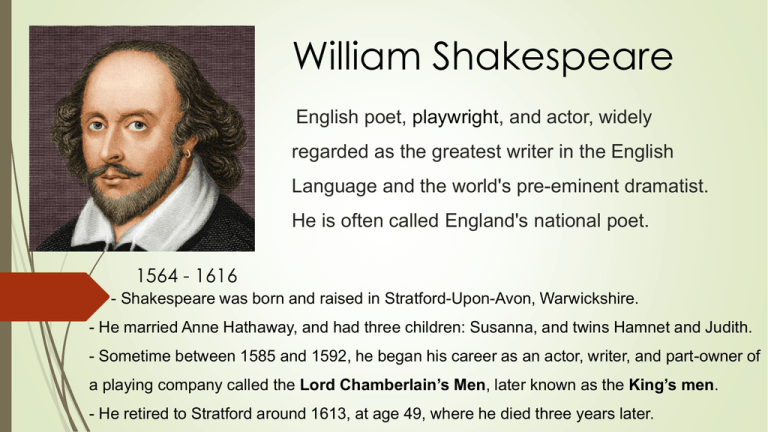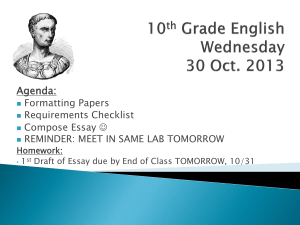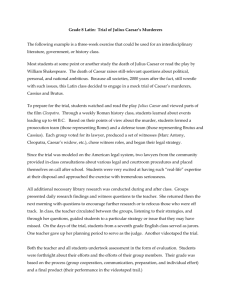Julius Caesar PPT
advertisement

William Shakespeare English poet, playwright, and actor, widely regarded as the greatest writer in the English Language and the world's pre-eminent dramatist. He is often called England's national poet. 1564 - 1616 - Shakespeare was born and raised in Stratford-Upon-Avon, Warwickshire. - He married Anne Hathaway, and had three children: Susanna, and twins Hamnet and Judith. - Sometime between 1585 and 1592, he began his career as an actor, writer, and part-owner of a playing company called the Lord Chamberlain’s Men, later known as the King’s men. - He retired to Stratford around 1613, at age 49, where he died three years later. Julius Caesar Roman statesman, general and notable author of Latin prose. He played a critical role in the events that led to the downfall of 100 BCE – 44 BCE the Roman Republic and the rise of the Roman Empire. - In 78 he became a legal prosecutor. - He became governor of Spain in 61. - In 60, he returns to Rome to form the first Triumvirate. (three important Roman rulers). - He had a love affair with Queen Cleopatra of Egypt. - He was stabbed 23 times by his own Friends on March 44. Julius Caesar. A play by W. Shakespeare Julius Caesar is a tragedy, believed to have been written in 1599. It is one of several plays written by Shakespeare based on true events from Roman History. 100 BCE – 44 BCE Although the title is Julius Caesar, Julius Caesar is not the most visible character in its action; he appears alive in only three scenes. Marcus Brutus speaks more than four times as many lines and the central psychological drama is his struggle between the conflicting demands of honor, patriotism and friendship. Julius Caesar. A play by W. Shakespeare Characters: - Julius Caesar - Calpurnia (Caesar’s wife) - Marcus Antonius (Triumvir after death of Caesar) - Marcus Brutus (Conspirator) - Portia (Brutus’s wife) - Cassius (Conspirator) Julius Caesar. A play by W. Shakespeare - Independent Reading (Homework/Classwork) - Answer questions - Complete exercises from book - Listen to Audio CD - Independent study/review (Homework) - Unannounced quizzes - It will be read in two weeks Hadrian's Wall also called the Roman Wall, Picts' Wall, or Vallum Hadriani in Latin, was a defensive fortification in the Roman province of Britannia, begun in 122 CE during the reign of the emperor Hadrian. It ran from the banks of the River Tyne near the North Sea and the Irish Sea. It had a stone base and a stone wall. There were milecastles with two turrets in between. There was a fort about every five miles. It is thought that the milecastles were staffed with static garrisons, whereas the forts had fighting garrisons of infantry and cavalry. In addition to the wall's defensive military role, its gates may have been used as customs posts. A significant portion of the wall still stands and can be followed on foot along the adjoining Hadrian’s Wall Path. It is the most popular tourist attraction in Northern When in use it was effectively the northern limit of the Roman Empire. Motifs in Drama A motif is an element or concept that appears throughout a play and helps develop the plot and theme. In this play, one motif is the appearance of omens foreshadowing doom for Caesar and confusion for Rome. Omen It is something believed to be a sign of future, good or evil. Example of omen A soothsayer warns Caesar to beware the Ides of March. This omen adds tension to the play (at that point) for both Caesar and the audience. Blank Verse It is a category of poetry based on unrhymed lines and a definite meter, usually of iambic pentameter, examples of which can be found in Shakespeare, William Cullen Bryant, and Robert Frost. You're still not sure what blank verse is? Well, to really understand blank verse, we need to look at meter, or the number of stressed and unstressed syllables in a line of poetry. This pattern usually takes a 'DADUM' effect when we read them. Take this example from John Berryman's 'The Ball Poem': What is the boy now, who has lost his ball, Can you hear the pattern of the unstressed and stressed syllables? With blank verse, we typically find iambic pentameter, which is five sets of unstressed/stressed iambs, for a total of ten syllables. So, if we look again at 'What is the boy now, who has lost his ball', We can see that we have a set of five iambs for a total of ten syllables. But what makes something blank verse is both the use of meter and unrhymed lines in the verse. Sometimes we see the iambic pentameter used to rhyme, like in Shakespeare's 'Shall I compare thee to a summer's day.' A soliloquy is a popular literary device often used in drama to reveal the innermost thoughts of a character. It is a great technique used to convey the progress of action of the play by means of expressing a character’s thoughts about a certain character or past, present or upcoming event while talking to himself without acknowledging the presence of any other person. Why would Cassius not want Brutus to hear the thoughts he expresses? Cassius explains that he is going to leave forged letters at Brutus’s house. Letters that compliment Brutus and subtly critique Caesar’s ambition. If Brutus knew that Cassius was trying to manipulate him, Brutus would be more cautious about listening to him. A tragedy is kind of drama that presents a serious subject matter about human suffering and corresponding terrible events in a dignified manner. How does Casca’s speech in lines 15-32 help build suspense? It helps build suspense because the details that he recounts establish a threatening mood and suggest that some violent event will occur soon. What kind of support does Cassius use to defend his opinion of Caesar? How effective is his argument? Cassius appears to support his view with emotions, not facts. He uses dramatic and exaggerated language to insult both, the Romans and Caesar. His argument seems quite effective, however, Casca immediately promises to keep quiet about what Cassius has said and to help Cassius form a group to deal with these “wrongs”. 1.- How son does Cassius plan to meet with Brutus? Why is he in a hurry? 2.- What does Cassius expect to be the result of this meeting? Why is he so optimistic? 3.- Why do the conspirators have “great need” of Brutus? Vocabulary idle cobbler thou knave nay beseech awl meddle saucy trod wherefore thy oft stream servile Intermit strew cull attire


